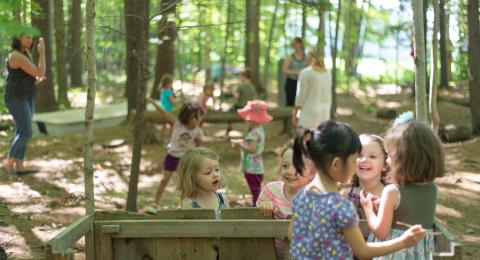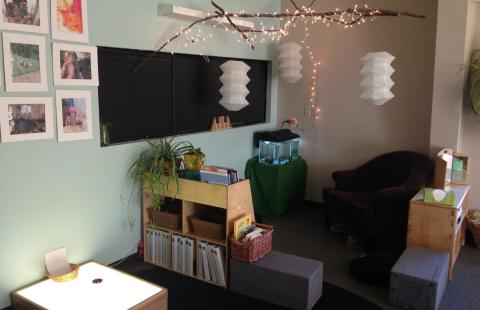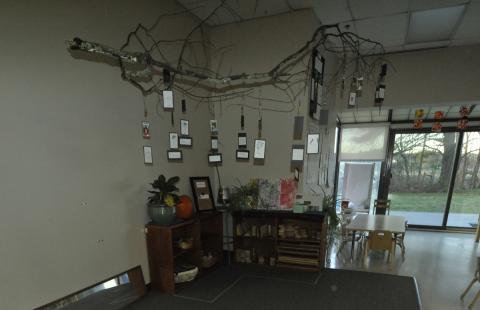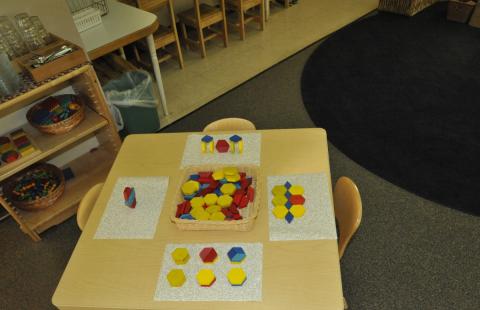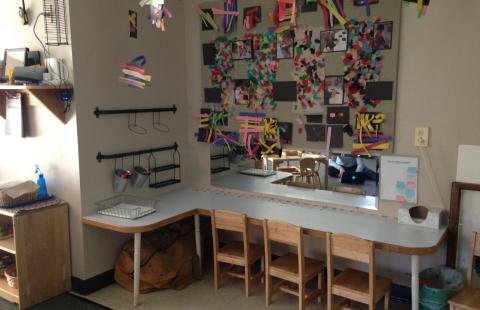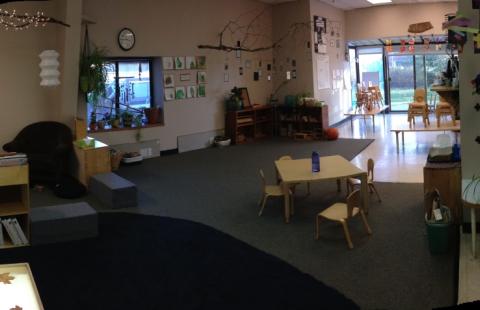15 children, 3-4 year olds (typically 34 months at the beginning of the CSDC school year) with 3 full-time teachers.
Preschool 1 Classroom Family Packet
The Preschool 1 handbook will be sent to you in August, containing information from your child’s teachers about the practices, philosophy, curriculum, and schedule of the classroom that builds on the CSDC Family Handbook.
Classroom Teachers
| Time: | Activity: |
|---|---|
| 7:30 | CSDC Opens - Indoor Snacks (AM Snack 8-8:30) |
| 9:30 | Morning Gathering |
| 10:00 | Group Snack |
| 9:00-10:00 | Outdoor Exploration & Provocations |
| 11:30-12:15 | Lunch |
| 12:00-12:30 | Books & transition to rest |
| 12:30-3:00 | Rest |
| 2:00 | Indoor Provocations (PM Snack 2:30 – 3:15) |
| 3:30-5:20 | Outdoor Exploration & Provocations |
| 5:20 | Final Pick up |
| 5:30 | CSDC Closed |
Preschool 1's Daily Schedule is subject to change due to weather or children's needs
Curriculum Development & Implementation
As a program inspired by schools in Reggio Emilia, Italy (often referred as a “Reggio inspired school”), CSDC practices emergent curriculum while providing your child with developmentally appropriate experiences and challenges. This means that we will be observing your child's play and social interactions to better understand their abilities and interests. We analyze anecdotal notes, photographs, and artifacts to further develop and plan classroom curriculum.
We believe that young children learn through socio-constructivism (the idea that learners co-construct knowledge within a social setting). We provide children with many opportunities to work with their peers to problem solve, form theories, and make new discoveries. Children and teachers spend time together questioning, researching, hypothesizing, and experimenting.
Play-based curriculum allows children to truly be at the center of their learning and move at their own pace. In addition, it offers children the opportunity to make decisions about what they would like to do and how they would like to do it. Provocations can be chosen independently, giving children power and control in this part of their day. Social interactions develop as children move from one area to another, negotiating play ideas, such as who will carry out each part of dramatization or who will be in charge of building parts of a block structure. Teachers engage in play with children when appropriate, challenging children’s thinking and extending their learning.
Provocations refer to the way we intentionally prepare the environment to pique children’s interest. Provocations draw children in and lend to deeper exploration of the materials. Each day we will have a variety of opportunities for children to work independently, in small groups, alongside a teacher, or parallel to each other. Teachers develop and facilitate investigations with children. This work is focused on children’s interests and often begins with a question for further research. Participating in investigation work offers children the opportunity to explore their understanding of a topic through hands-on explorations and research. This allows children to move at their own pace and enables each child to extend their current level of understanding while also promoting problem solving.
Foundations & Frameworks
In addition to emergent curriculum, we also take into consideration the topics that re-occur each year in Preschool 1, including but not limited to the following:
Developing Self Identity and Autonomy
Children in Preschool 1 are at a stage in development where they are working to discover who they are and how they fit into their family, classroom, and community as a whole. Children are noticing the characteristics that distinguish them as an individual. What is their role in these settings? What control do they have over their lives? Children begin to search for their independence and begin exploring the power of their words.
Developing a Collaborative Disposition
We will be working together to create a sense of community where each child feels validated, a sense of belonging, and has ownership of the classroom space. We strive to help children form relationships with their peers and teachers. Part of this process consists of children negotiating with each other to problem solve and advocate for themselves. Children will be encouraged to share how they are feeling and why they are feeling that way.
Exploring the Natural Environment
Our outdoor environment is our second classroom filled with rich moments of exploration and discovery. The children in Preschool 1 will experience the garden, the woods & nature trail, as well as go on trips to the reservoir and horse trails. We encourage children to challenge themselves physically as well as push and extend their understanding of the world around them. This is an area where the children’s vision of their own learning comes to life and they have great power to influence the space. The exploration of the natural environment is an important component of the developing children’s understanding of scientific knowledge.
Exploring The Arts: Music, Drama and Art Mediums
Introducing the arts to children opens the door for many discoveries. As a Reggio Inspired school, we provide children with the opportunities to communicate their knowledge, questions, and interests through multiple means of creative expression. This may include art media, drama, music, and innovative discoveries by children.
Using Tools and Technology
We refer to the word tools as the authentic materials we used with children, including but not limited to saws, drills, hot glue tools, tape measures, and staplers. As we introduce children to these tools, we demonstrate how they are safely used, and what jobs we can accomplish with them. The world of technology is ever changing and evolving. As teachers, we use many different pieces of technology to document children’s development and curriculum by using laptops, tablets, and audio recorders. While being mindful of the amount of screen time children are having, we provide children with opportunities to use these tools as appropriate to document their work in manners similar to their teachers.
